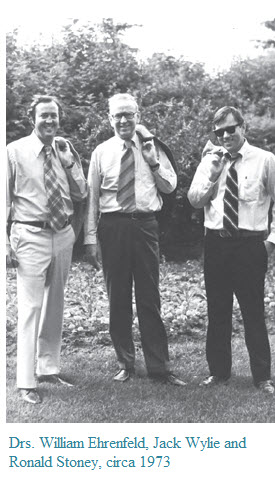The UCSF Division of Vascular & Endovascular Surgery evolved from the education and surgical training program of the Department of Surgery at UCSF. Edwin Jack Wylie, M.D., as a third year resident, was exposed to Norman Freeman, M.D., a pioneer in vascular surgery and chief of the vascular clinic. After completing his residency in 1948, he began his professional career as a member of the UCSF surgical clinical faculty. He then became a Professor of Surgery and a Vice-Chair of the UCSF Department of Surgery in the 1960s.
Pioneering Vision
In January 1951, Wylie performed the first aorto-iliac thromboendarterectomy in the U.S. This pioneering effort was highly successful and only one of the many visionary concepts concerning vascular disease and the care of vascular patients that he would introduce. In 1958, a vascular surgical service was established at UCSF, and the general surgery residents were assigned rotations (3-6 months) for specific vascular surgery training.
The Nation's First Fellowship in Vascular Surgery
In 1962, Malcolm Perry M.D. was appointed as UCSF's first Vascular Surgical Fellow and completed an intense one-year training program. During his training, he conducted clinical research in cerebrovascular disease. The UCSF Vascular Surgery fellowship was the first in the U.S. More than 100 fellows have completed their training here, prior to embarking on a career in vascular surgery (more than half are in academic centers, in the U.S. or abroad).
A Quest for Excellence

The guiding principles that evolved under Jack Wylie were thoughtful care of the patient, an understanding of vascular disease, developing technical proficiency and providing training for vascular surgeons. In 1972, Wylie's presidential address to the International Society of Cardiovascular Surgery was entitled, Vascular Surgery - A Quest for Excellence.
This presentation captured his philosophy - concern for the patient threatened by vascular disease, the complexities of vascular disease and its treatment, and the need to establish training standards and monitor vascular fellowship training programs so that they might provide the highest quality care and treatment for the threatened patients.
Over the next decade, these issues were all adopted and vascular fellowships and certification of vascular trainees became a reality.
Jack Wylie died shortly after receiving the first Certificate of Special Competence in Vascular Surgery - No.1, by the American Board of Surgery, in September 1982.
During the 1980s and 90s, the vascular division continued under the co-direction of Drs. Ronald J. Stoney and William Ehrenfeld, members of the UCSF surgical faculty and Wylie's partners. They emphasized and continued the strong fellowship training program, developed innovative operative treatment of complex vascular problems, and published cutting edge clinical research.